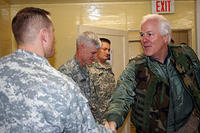-
U.S., South Korea delay nuclear fuel deal
The president of South Korea, Park Geun-Hye, has been campaigning to get the United States to lift the ban on South Korea from enriching uranium and processing spent nuclear fuel. The ban was part of a 1972 treaty, which was set to expire next March. A deal appeared to be on the way at some point this year, but officials from both countries said the deadline would be extended to 2016. What did not help the negotiations were statements by some South Korean officials that the country should build its own nuclear weapons reather than rely on U.S. nuclear umbrella.
-
-
FBI looking for a “person of interest” who may have helped the Tsanaev brothers
Lawmakers with knowledge of the investigation into the Boston marathon bombing said over the weekend that law enforcement agencies are looking for a “person of interest” who may have been involved with the Tsarnaev brothers in preparing the attack. The lawmakers highlighted the fact that law enforcement agencies are not convinced that the brothers acted alone, without any help of one or two more people.
-
-
Lawmakers renew effort to reach bipartisan gun control compromise
Lawmakers have quietly begun discussions over gun control measures, with a bi-partisan group of senators trying to come up with a compromise to solve the differences that led to the failure two weeks ago of a comprehensive overhaul effort.
-
-
Jewish Security Summit discusses communal safety
Leaders from the Jewish Federations of North America (JFNA) and other Jewish organizations gathered last week at the first Jewish Communal Security Summit in New York to strategize with top experts in the field how best to keep the community safe.Security providers from around the country had a chance to learn about best practices in threat assessment and response in the current climate.
-
-
Sen. Cornyn, critics exchange charges over immigration reform measure

Texas critics charge that Senator John Cornyn (R-Texas) is likely to oppose the Gang of Eight bipartisan immigration overhaul proposal, even though it meets his demands on border security, because he is worried about a Tea Party primary challenge. Cornyn disagrees.
-
-
New fertilizer can be used to grow food – but not build bombs

Ammonium nitrate fertilizer is used in agriculture, but when mixed with a fuel such as diesel, it is highly explosive. It was used in about 65 percent of the 16,300 homemade IEDs in Afghanistan in 2012.About 1,900 troops were killed or wounded in IED attacks in 2012, 60 percent of American combat casualties. There have been more than 17,000 global IED incidents in 123 countries in the past two years. Timothy McVeigh used ammonium nitrate in Oklahoma City in 1995. Scientists have developed a fertilizer that helps plants grow but cannot detonate a bomb.
-
-
Tamerlan Tsarnaev's name was on U.S. terror watchlist since 2011

In March 2011, after being contacted by the Russian security services, the CIA added the name of Tamerlan Tsarnaev to the U.S. government’s terror watchlist. DHS secretary Janet Napolitano said that Tamerlan’s travel to Dagestan, and his arrival back in the United States, were “pinged” by the department. Leading lawmakers have raised questions about whether the U.S. intelligence community and law enforcement agencies have dropped the ball on the Tsarnaev brothers.
-
-
White House to take a second look at FAA furloughs

The White House hinted Wednesday that it could accept legislation which would end Federal Aviation Administration (FAA) furloughs. Passengers have been in arms over lengthening flight delays and a growing number of flight cancellations, while GOP lawmakers accused the FAA of implementing the sequester-mandated budget cut in such a way so as to cause maximum inconvenience to passengers.
-
-
Gay rights advocates want immigration reform bill to recognize gay couples
Gay rights advocates are campaigning for changes in the bi-partisan Senate immigration overhaul bill so that it would include homosexual couples. Democrats, however, are being cautious, fearing that adding a reference to gay couples would cause many GOP lawmakers to reject the bill.
-
-
Atlanta losing DHS area security grant money
The city of Atlanta is losing DHS grant money used to strengthen the city’s ability to protect against a terrorist attack. Despite being home to recent high profile events such as the NCAA’s Final Four, federal records show the amount of money allocated to Atlanta through urban area security grants has dropped from $13 million in 2010 to $5 million last year.
-
-
Office implementing Obamacare avoids furloughs
Gary Cohen, the director of the Center for Consumer Information and Insurance Oversight, said Wednesday that his office will not be furloughing its workers due to the federal budget cuts known as the sequester. His office is in charge of implementing most of President Obama’s healthcare law.
-
-
EPA slams State Department’s Keystone XL pipeline review
The Environmental Protection Agency (EPA) on Monday criticized the State Department’s environmental impact review of the Keystone XL pipeline, saying there was not enough evidence to back up key conclusions in the review on emissions, safety, and alternative routes. The EPA’s comments could have a negative effect on the approval of the project, but if the project is approved, the comments could serve as supporting evidence in any ligation against the pipeline.
-
-
Dzhokhar Tsarnaev had no firearms, explosives with him when captured
More details have emerged to shed light on the last few hours before 19-year old Dzhokhar Tsarnaev was captured hiding on a boat in Watertown, Massachusetts. Tsarnaev had no weapons or explosives with him in the boat where he was hiding. Boston police officers say that the heavy fire directed at the boat was probably the result of chaos of the moment. In a tense and charged atmosphere, one accidental shot could have caused what police call “contagious fire.” Tsarnaev sustained severe injuries, some of them to his neck and lower jaw, preventing him from talking. This led to rumors in the press that he tried to take his own life, but failed. We now know that he could not have tried to take his life because he had no firearms with him on the boat.
-
-
Experts: security of U.S. mass transit system must be tightened

Counterterrorism experts are arguing that security on America’s mass transit lines must be tightened in light of the foiled plot to attack a Toronto passenger train. The plan to attack Canada’s transit system highlights security holes in America’s commuter system, and the challenges involved in securing this vast system.
-
-
Lawmakers question Napolitano on border-security measurement methods
Senators Tuesday grilled DHS secretary Janet Napolitano on what methods her department will use to provide a “meaningful” border-security measurement, which is a key condition for implementing a bipartisan immigration reform legislation unveiled last week.
-
More headlines
The long view
Factories First: Winning the Drone War Before It Starts
Wars are won by factories before they are won on the battlefield,Martin C. Feldmann writes, noting that the United States lacks the manufacturing depth for the coming drone age. Rectifying this situation “will take far more than procurement tweaks,” Feldmann writes. “It demands a national-level, wartime-scale industrial mobilization.”
No Nation Is an Island: The Dangers of Modern U.S. Isolationism
The resurgence of isolationist sentiment in American politics is understandable but misguided. While the desire to refocus on domestic renewal is justified, retreating from the world will not bring the security, prosperity, or sovereignty that its proponents promise. On the contrary, it invites instability, diminishes U.S. influence, and erodes the democratic order the U.S. helped forge.
Fragmented by Design: USAID’s Dismantling and the Future of American Foreign Aid
The Trump administration launched an aggressive restructuring of U.S. foreign aid, effectively dismantling the United States Agency for International Development (USAID). The humanitarian and geopolitical fallout of the demise of USAID includes shuttered clinics, destroyed food aid, and China’s growing influence in the global south. This new era of American soft power will determine how, and whether, the U.S. continues to lead in global development.
Water Wars: A Historic Agreement Between Mexico and US Is Ramping Up Border Tension
As climate change drives rising temperatures and changes in rainfall, Mexico and the US are in the middle of a conflict over water, putting an additional strain on their relationship. Partly due to constant droughts, Mexico has struggled to maintain its water deliveries for much of the last 25 years, deliveries to which it is obligated by a 1944 water-sharing agreement between the two countries.
How Disastrous Was the Trump-Putin Meeting?
In Alaska, Trump got played by Putin. Therefore, Steven Pifer writes, the European leaders and Zelensky have to “diplomatically offer suggestions to walk Trump back from a position that he does not appear to understand would be bad for Ukraine, bad for Europe, and bad for American interests. And they have to do so without setting off an explosion that could disrupt U.S.-Ukrainian and U.S.-European relations—all to the delight of Putin and the Kremlin.”
How Male Grievance Fuels Radicalization and Extremist Violence
Social extremism is evolving in reach and form. While traditional racial supremacy ideologies remain, contemporary movements are now often fueled by something more personal and emotionally resonant: male grievance.
